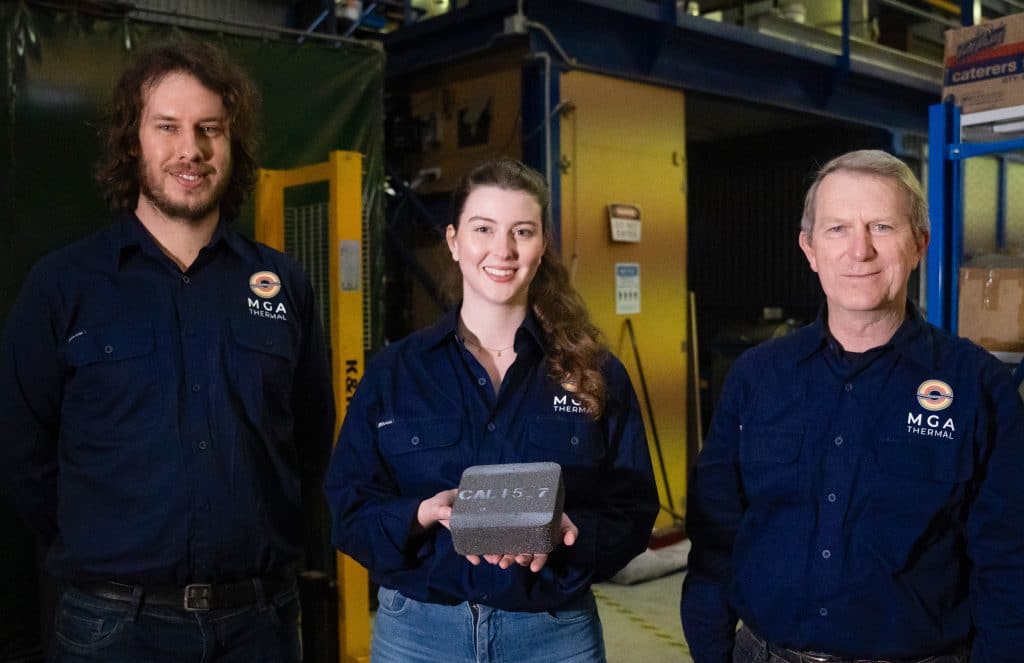Alex Post, Arden Jarrett and Erish Kisi from MGA Thermal with one of their Thermal energy storage blocks
MGA Thermal: An Innovative Solution to Energy Storage

Newcastle based MGA Thermal are doing big things in the energy storage space

Born out of cutting-edge research at the University of Newcastle, the company has developed and brought to market a system to effectively store renewable energy for on-demand delivery. The shift from fossil fuels to renewables is a huge part of tackling our impact on the planet. However, while renewables have seen significant investment, technology to store energy for consistent supply has lagged.
Many solutions that have been developed for energy storage take too narrow a view of the complex and interconnected problem facing us this century. Resulting in further issues, often with unforeseen consequences that will need to be addressed in the future. To be workable in the long term, energy storage solutions must not just be affordable and scalable, but also safe for the environment and human health. Designing such a system to incorporate recycled materials that are then recoverable at the end of life, will ensure that we avoid generating more waste while maximising the value of the resources we have. To minimise the shock of change for both companies and the communities in which they are embedded, technology shifts must also allow for managed transition over time.
MGA Thermals’ storage technology addresses all of these issues and, embodying the principles of the circular economy, thinks beyond the narrow scope of the storage problem to the wider environmental and social impacts across the lifecycle of the product, from cradle-to-cradle.
The technology
The Miscibility Gaps Alloy (MGA) storage system is built around an innovative block that stores energy generated by renewables. This thermal energy can then be used on-demand to generate electricity, for example: by heating water to form steam, which can then be used for driving the turbines of repurposed thermal power stations without burning coal.

The blocks can be made from recycled materials and then are able to be completely recycled at end of life
The blocks
The blocks are made from two carefully matched materials. One forms a matrix that maintains its shape and structural integrity. The other material is spread out throughout this matrix in small particles like chocolate chips in a muffin. When energy in the form of heat is transferred into the blocks, the solid matrix material holds its shape and evenly distributes the heat. The particles then absorb the heat and store it through a phase change from a solid to a liquid state. Innovative pairing for the materials’ different properties allows for safe storage of the thermal energy and its controlled release on demand. This system can store similar amounts of energy to other technologies like lithium batteries but costs a fraction of the price. Block dimensions can be manufactured to match the project needs, allowing for stackable units, which can be flexibly scaled.
The research team’s forward-thinking approach to developing the blocks embodies the essence of designing for circularity. From the beginning, consideration was given to the safety of the materials for people and the environment. Other key concerns from the outset were their cost and availability, the ability to obtain them from recycled materials, and the ability to separate and reuse the materials at the end of the products life so that they generate zero waste.
Avoiding waste by repurposing existing infrastructure
The transition away from fossil fuel energy generation will create a range of challenges. One of them is the closure of existing coal-fired power stations and their connected grid infrastructure. Around the world, there are staggering amounts of capital and materials locked into the existing infrastructure surrounding these power plants, including in the existing grid networks and the power stations themselves. Transition away from fossil fuels creates the challenge of what to do with this infrastructure to avoid it becoming waste. MGA Thermals’ technology provides an answer. By fitting their thermal storage system directly into this infrastructure, it can be repurposed to power the existing turbines in these power stations for clean energy storage, rather than coal power generation. This not only saves years in the construction and planning approvals for alternative infrastructure, it also stops the resources embedded in these sites from becoming waste and the sites themselves from becoming derelict.
Managed transition
Surrounding communities and businesses can experience sudden socioeconomic shock when plants are decommissioned and go offline across short timeframes. And so, the shift away from fossil fuels can cause devastation to communities without alternative employment opportunities.
The scalability of MGA Thermals’ system offers a solution to a managed suitable energy transition. The capacity to scale up storage over time means that it is not necessary to wait for a power station to be decommissioned. Instead, the system can be installed starting at as little as 1% of capacity and be increased at a rate that allows for managed transition, including retraining and job creation. This can temper the devastating community impacts that follow the sudden closure of large employers.
Scaling Manufacturing
Newcastle is emerging as a hotspot of innovation in the renewable energy space and it is companies like MGA Thermal that are showing the way. Newcastle provides an ideal location for their expansion given the depth of manufacturing capacity and the region’s increasing pivot from coal towards renewable energy generation. In addition, the Port of Newcastle allows access to shipping for national and international projects. MGA Thermal has begun scaling capacity at their manufacturing facilities in Newcastle, and are currently developing partnerships to meet commercial demand for their storage systems both in Australia and in Europe.
For more information on MGA Thermal visit their website.
GET IN TOUCH

